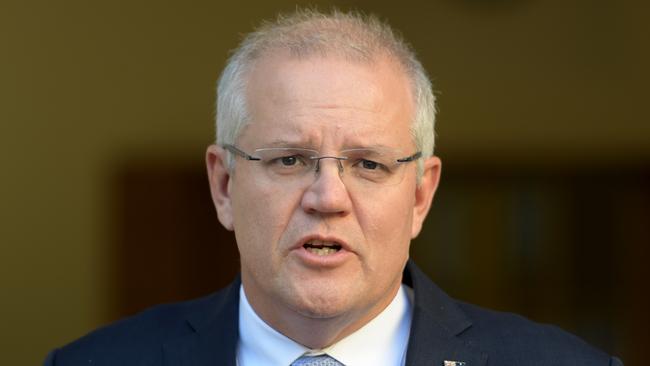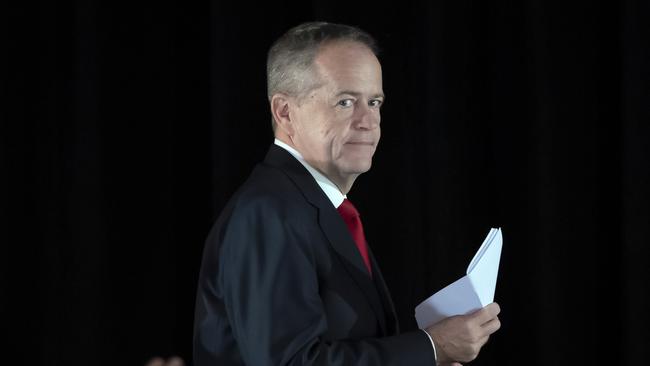Tory Shepherd: Reading the vibe will never take the place of data
Polling data is still the best way to gather evidence about how political parties are going. That doesn’t change just because at the most recent election was consistently, humiliatingly, wrong, writes Tory Shepherd.
Rendezview
Don't miss out on the headlines from Rendezview. Followed categories will be added to My News.
People talk about reading the mood of the electorate as though “the electorate” is a dingy laneway that everyone has scrawled their thoughts on.
A few swear words, something about death taxes, a defaced Bill Shorten and a bad smell wafting from somewhere. As though you can swan down to the local bowls club and have a natter with Ken, Bev and Stu, then interrupt a bunch of road workers for a chinwag and walk away knowing how the election’s going to pan out.
How good’s reading moods?
Not that good. As much as we loved bumbling lawyer Denis Denuto appealing to “the vibe” in The Castle, that’s not how the Constitution works in real life (“It’s the vibe of it. It’s the Constitution. It’s Mabo. It’s justice. It’s law. It’s the vibe and ah, no, that’s it. It’s the vibe. I rest my case.”).
Going for the vibe, or the mood, is just fuzzy thinking.

Unless you talk to hundreds of people in a single electorate. Each electorate is home to about 100,000 voters. Talk to enough of them and you might capture the mood. Because, if you talk to enough of them, then you have a poll.
If you’re digging in to where the undecided voters are going to break, you might make a slightly more educated guess. You might read about a leaked poll that turns out to be right. But at the time, how would you know if you can trust it?
MORE FROM TORY SHEPHERD: Political dirty deeds come mighty steep
Transparent data is still the best way to gather evidence about how political parties are going. That doesn’t change just because the data at this most recent election was consistently, humiliatingly, wrong.
Major polls kept putting Labor in front by a couple of points. The result was the Coalition ahead by about three.
So the polling companies will go and search down the back of the couch for missing votes.

They’ll have to work out the effect of the death of landlines, and whether people are self-selecting by even answering questions. They’ll look at sample sizes and whether robocalls are skewing the results. They’ll rethink preferences, perhaps.
And on the other side, there’ll be much gazing into navels about how we use polls in future. They’ll be given less prominence, surely, and far more context. At this point, no one seems to have learned the lesson about going off half-cocked, as they talk about the lessons they have to learn (The butler did it! It was Colonel Mustard! The salmon mousse! Franking credits! Quiet Australians!).
RELATED: The Left are now doing the Coalition’s hard work for them
There’s no one answer.
There were swings to the Greens as well as One Nation.
The nation is not uniform and states are not uniform — roll your eyeballs down the Australian Electoral Commission’s tallies and the vote skitters all over the place.
Electorates are not uniform. Think of your own electorate and how different it might be in different pockets.
Once you get down to booths, you may be able to sense something — you just might even be able to detect a “mood” at that level just by chewing the fat with people. Maybe.
If you talk to a lot of the right people and they are representative of the voters. But even then, you can’t extrapolate it to a whole electorate.
Blaming people — including journalists — for not “reading the mood” is part of this festering move towards trusting emotions over facts. Instinct over truth.
There were immediate crass comparisons to the results in the US — electing Donald Trump — and in the UK — voting for Brexit. True, these were all surprise votes. But Australia is quite different because of compulsory voting.

We have a long history of reliable polling — reliable enough that we should have been able to trust it.
Commentators are talking about the “Canberra bubble” as though reporters all over the country were just mainlining Parliament House feeds, when in fact they were often out in the community.
But while there were many excellent colour stories of how people were feeling in Mayo and Boothby and all over Queensland, they still needed to be set against those polls. And those polls formed the narrative that the momentum was for Labor.
They turned out to be wrong (though they were mostly within the margin of error, there were so many of them, and by different companies, that the data seemed accurate). But that doesn’t mean we only have the “mood” and the “vibe”.
The Daily Telegraph went behind the scenes of the election campaign where Prime Minister Scott Morrison was trying to “win the seat-by-seat battles”.
He had internal polls for key seats crunched every night. Good data, local data. His polls were right. His camp tracked a path to victory and relentlessly followed it, driven by data. It worked.
The best data won.
How good’s data?



